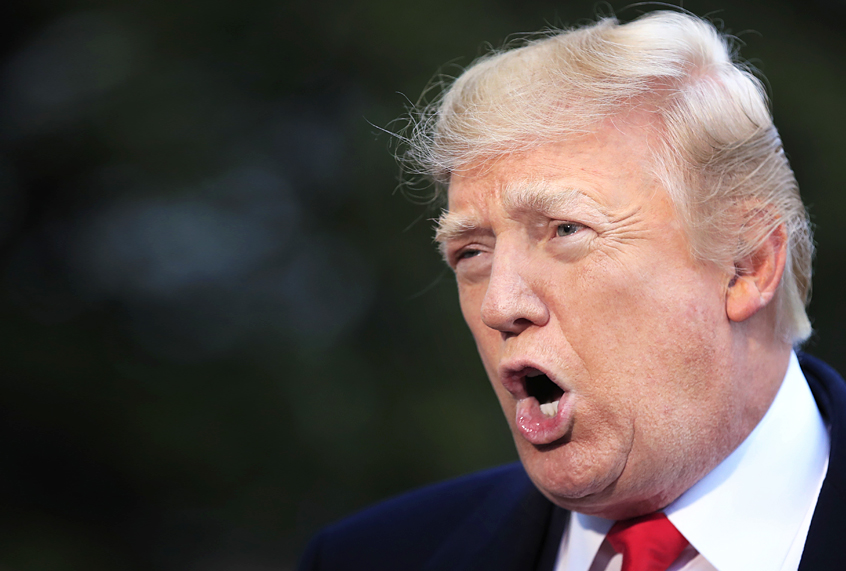President Donald Trump may want Americans to think that Democrats are the ones holding up an immigration deal to protect DACA beneficiaries — but Republican partisanship is the real culprit.
House Republicans may have a bill — sponsored by Virginia Rep. Chairman Bob Goodlatte — ready to go to address Deferred Action for Childhood Arrivals beneficiaries; his proposal is being pushed by many powerful House Republicans. According to the bill, which is unlikely to receive any Democratic support, according to Politico, was developed by GOP members of Congress from a number of factions within the party, including House Freedom Caucus conservative Raul Labrador, R-Idaho, Homeland Security Committee Chairman Michael McCaul, R-Texas and Rep. Martha McSally, R-Ariz., who’s running for Sen. Jeff Flake’s seat later this year.
The Goodlatte version of the bill would increase border security and immigration enforcement as well as require verification of workers, according to CNN. It would even more conservative than the Senate version of the bill supported by Republicans John Cornyn of Texas, and Judiciary Chairman Chuck Grassley of Iowa. The Senate bill would replace the visa lottery program with alternatives like temporary protected status and eliminate chain migration, although not for everybody as Trump has requested, according to Sen. Jeff Flake, R-Ariz., during a Sunday appearance on “This Week.”
The fate of Goodlatte’s bill is uncertain. House Speaker Paul Ryan has not yet committed to a vote on the bill, perhaps because the conservative measure won’t get the bipartisan support that Ryan repeatedly stated was a prerequisite for any DACA legislation. The bill is also hindered by the fact that it would be very unlikely to pass in the Senate, where Republicans only have a 51-49 majority over Democrats. Finally, the bill’s prospects are dampened by the fact that senators from both parties were able to reach a deal to create a path to citizenship for individuals would benefit from DACA — that is, the so-called Dreamers who came to the United States illegally when they were children.
Still, Trump blamed Democrats for his bill’s failures.
“Well, I don’t think the — honestly, I don’t think the Democrats want to make a deal,” Trump told reporters before a dinner with House Majority Leader Kevin McCarthy, R-Calif. “I think they talk about DACA, but they don’t want to help the DACA people.”
He added, “I think you have a lot of sticking points, but they’re all Democrat sticking points, because we are ready, willing, and able to make a deal, but they don’t want to. They don’t want security at the border. We have people pouring in. They don’t want security at the border, and they don’t want to stop drugs. And they want to take money away from our military, which we cannot do. So those are some of the sticking points.”
Trump reiterated these points on Twitter throughout the weekend.
The Democrats are all talk and no action. They are doing nothing to fix DACA. Great opportunity missed. Too bad!
— Donald J. Trump (@realDonaldTrump) January 13, 2018
AMERICA FIRST!
— Donald J. Trump (@realDonaldTrump) January 13, 2018
I don’t believe the Democrats really want to see a deal on DACA. They are all talk and no action. This is the time but, day by day, they are blowing the one great opportunity they have. Too bad!
— Donald J. Trump (@realDonaldTrump) January 13, 2018
DACA is probably dead because the Democrats don’t really want it, they just want to talk and take desperately needed money away from our Military.
— Donald J. Trump (@realDonaldTrump) January 14, 2018
I, as President, want people coming into our Country who are going to help us become strong and great again, people coming in through a system based on MERIT. No more Lotteries! #AMERICA FIRST
— Donald J. Trump (@realDonaldTrump) January 14, 2018
Statement by me last night in Florida: “Honestly, I don’t think the Democrats want to make a deal. They talk about DACA, but they don’t want to help..We are ready, willing and able to make a deal but they don’t want to. They don’t want security at the border, they don’t want…..
— Donald J. Trump (@realDonaldTrump) January 15, 2018
…to stop drugs, they want to take money away from our military which we cannot do.” My standard is very simple, AMERICA FIRST & MAKE AMERICA GREAT AGAIN!
— Donald J. Trump (@realDonaldTrump) January 15, 2018
Yet the bipartisan Senate deal also has an uncertain future. In part this is because House conservatives are worried that Ryan will try to force a more moderate Senate deal on them, reviving many of the political wounds that played a role in House Speaker John Boehner being driven out of his leadership position in 2015. That said, the difficulties can also be attributed to Trump denouncing the Senate plan as a “step backwards.”
Trump has repeatedly mischaracterized the DACA program in the past, such as by depicting it as intended to keep unsafe immigrants out of the United States.
“The DACA program, it’s something that you need to be not a criminal to receive DACA. Like, you literally have to pass an extreme background check and you need to do it every two years. So if it any point you committed a crime within the two years you had DACA and reapplied again, that is taken away from you,” Pamela Chomba, northeast organizing director for FWD.us, told Salon in September.

